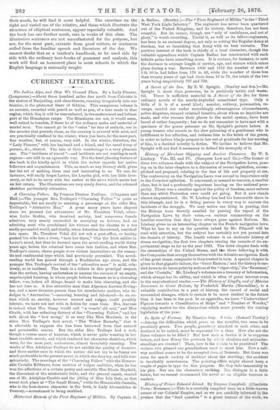A Charming Fellow. By Frances Eleanor Trollope. (Chapman and Hall.)—The
younger Mrs. Trollope's "Charming Fellow " is quite as improbable, but not nearly so amusing a personage as the elder Mrs. Trollope's "Attractive Man." A great many years have elapsed since we perused the adventures of Mr. Theodore Vidal, other- wise Luke Stubbs, who deceived society, had numerous female admirers, very nearly succeeded in marrying an heiress, had an admiring aunt who proclaimed his virtues and his charms to a too easily-persuaded world, and finally, when detection threatened, vanished into space. Mr. Theodore Vidal did not rob a post-office, or having pushed his wife into a river, "lave her there," like the Irish soldier in Lever's novel, but then he dawned upon the novel-reading world thirty years ago, before the criminal hero came into fashion, and when Mrs. Trollope's coarse, clever people were violent innovations on the roman- tics and sentimental type which had previously prevailed. The novel- reading world has passed through a Braddonian age since, and the younger Mrs. Trollope's revival of the " attractive man " is mild, rela- tively, as to incident. The book is a failure in this principal respect, that the author, having undertaken to narrate the success of an empty, unprincipled humbug, in whom people believe because he is a charming fellow, was, before all things, bound to make him charming, and she has not done so. A less attractive man than Algernon Ancram Erring- ton, and a more tiresome person than his mendacious mother, who in- dulges in " Ancramism "—meaning boasting and falsehood—to an ex- tent which no society, however narrow and vulgar, could possibly tolerate, we have not met with in fiction for some time. Mrs. Ancram is indeed what Mrs. Gamp would call "a wearin' old soul," and Miss Chubb, with her reflecting flattery of the "Charming Fellow," and her talk about the " bow mong," is so very like Miss Morrison, in the elder Mrs. Trollope's best novel, The Widow Barnaby," that it is allowable to suppose she hao been borrowed from that natural and permissible source. But the elder Mrs. Trollop° had a real, though a coarse sense of humour, which is never quite wanting in her least readable novels, and which rendered her character-sketches, which were, for the most part, caricatures, almost invariably amusing. The works of Mrs. Adolphus Trollope do not exhibit the quality of humour, and those earlier ones in which the author did not try to be funny are much preferable to the present novel, in which she does try, and fails con- spicuously. The marriage of the "Charming Fellow " with the Honour. able Castalia Kilfinane, from motives of vulgar ambition, when ho has won the affections of a certain pretty and amiable Miss Rhoda Mayfield, the discontent of the aristocratic bride, and the general smash, remind one of Mr. Adolphus Crosbie and the jilting of Miss Lily Dale, as that event took place at " The Small House," while the Honourable Castalia, who is the best-drawn character in the book, is Lady Alexandrine de Courcey,—accustomed to being snubbed.


































 Previous page
Previous page